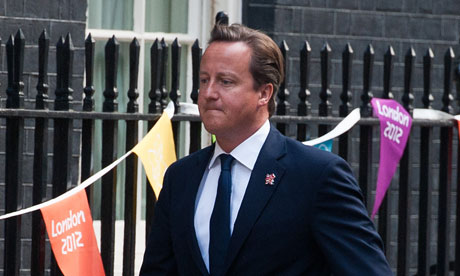This was a reshuffle by the Conservative party for the Conservative party, designed to make the party more at ease with itself, and allow it to be seen as a distinctive right of centre ideological force at the next election.
It is not a reshuffle for the coalition, or more cohesive government. In his choices Cameron has shown little deference to Nick Clegg, and instead paid attention to the demands of his parliamentary party. The Rose Garden is now closed until further notice.
All five Liberal Democrat cabinet ministers may have been retained in their current posts, but when the quintet look round the table at the first meeting of the cabinet, they will see a constellation of forces ranged against them has strengthened significantly.
Indeed some Liberal Democrat MPs privately questioned whether Nick Clegg had bargained as hard as he could in this reshuffle, and whether he allowed too much to pass so long as his chief political prize – the return of David Laws to government – was secured.
The famous five now confront Owen Paterson at the department of environment, opposed to renewable subsidies and supportive of shale gas. He will face battles ahead with the energy secretary Ed Davey, as well as with Clegg on EU issues such as fisheries.
At the Ministry of Justice, instead of the liberal Kenneth Clarke they face Chris Grayling – "a man who does not have a liberal bone in his body" according to one Lib Dem MP .
At the Department for Transport, Patrick McLoughlin, the former chief whip, may be an agnostic on aviation — he has a fear of flying – but he will do Downing Street's broad bidding. In the words of the London Mayor Boris Johnson, Justine Greening can only have been shifted from transport after just 10 months to make way for a new policy on the third runway at Heathrow built round a new all-party commission on the future of aviation.
Equalities, a brief previously held in the home office by the Home Secretary Theresa May and the Lib Dem Lynn Featherstone, has been sent to the Department for Culture, Media and Sport, one of the few departments in which no Lib Dem minister serves.
At the same time it emerged that Vince Cable, the business secretary, was not consulted over the appointment of Matthew Hancock and Michael Fallon in his department. Conservative sources were openly briefing that the two men had in part been appointed to keep a hawkish eye on Cable as the battle hots up over deregulation as the primary route to growth. Fallon was being presented by Downing Street as "a voice for business" in the department of business, implying there has not been one there hitherto.
The extent to which Vince's wagons are in reality being circled by hostile Tories can be exaggerated. Hancock is an intellectual who can have a serious debate with Cable, and David Willetts the moderate higher education minister remains in place. He has a serious relationship with Cable. But the net effect will be that Cable, and his Lib Dem colleague Jo Swinson in the department, will have to argue their corner that much harder at business to get an agreed policy.
It is also strange that Nick Harvey – the respected Lib Dem armed forces minister – has been sacked by Clegg, meaning they have vacated the defence department entirely. Harvey's dismissal came out of the blue and has hit him hard since he was intimately involved in drawing up a policy on the replacement for trident nuclear submarine programme due to be published next year.
Harvey had good relations with the defence secretary Philip Hammond, but was told by Clegg that he wanted to focus his finite ministerial resources on those departments from which they could get most media traction, and argued it was more important for a green party such as the Liberal Democrats for the first time to have a minister at the department of environment.
The stronger counter argument is that with Davey as energy secretary, the Lib Dems' green agenda was well covered, and Harvey was using his base to propose a serious alternative to Trident renewal.
Harvey expressed some of his unease, telling the Guardian: " I hope very much that the absence of a Lib Dem voice in the Ministry of Defence does not make it more difficult to ensure that the review comes up with the options we would like".
Clegg has told Harvey that he will personally oversee the review through the cabinet office where David Laws will also be present. Harvey regarded Trident, and the knowledge base of the ministry of defence, as critical to the Liberal Democrats.
Even the appointment of Jeremy Hunt to the Department of Health is not an unalloyed plus for the Lib Dems. Nick Clegg in an effective vote of no confidence in Hunt's handling of the Rupert Murdoch's bid for BskyB ordered his MPs not to vote against a censure motion tabled by Labour in the Commons. Yet in a sign that Cameron totally disagrees with Clegg's judgement, the prime minister has promoted Hunt to the most politically sensitive public service post in the cabinet.
At least Andrew Lansley's departure allows Norman Lamb to return to health, a brief he held with distinction for the Lib Dems in opposition. Lansley barred him from health over a bitter pre-election row the two men had on the future of social care. Lamb's arrival will also allow the Lib Dems to distance themselves from the Lansley reforms, and focus on social care, another hot election issue. The Lib Dem health minister Paul Burstow, a supporter of the Lansley reforms, has been quietly ditched.
Senior Lib Dem officials did not deny the reshuffle will be seen as a shift to the right, but took solace in arguing the coalition agreement and the decision making processes, including government write rounds and meetings of the Quad, remain firmly intact.
It is also hard to overestimate how important the Lib Dems regard the appointment of Laws, one of the most effective figures to grace Lib Dem benches.
It will be fascinating to see whether Laws can co-operate with the education secretary Michael Gove and yet manage to gain some political kudos for his party for the reforming work on social mobility that up until now Gove has been able to claim solely for himself.
But that will be the perennial coalition tension as the general election approaches – the conflict between effective government and party interest.
• This article was amended on 5 September 2012. The original said it was hard to underestimate how important the appointment of Laws was to the Lib Dems. That has been corrected.










